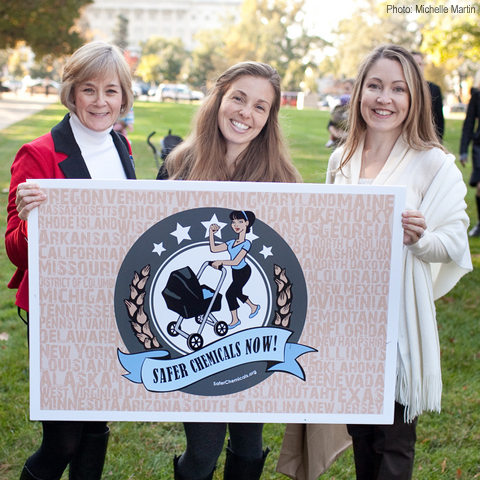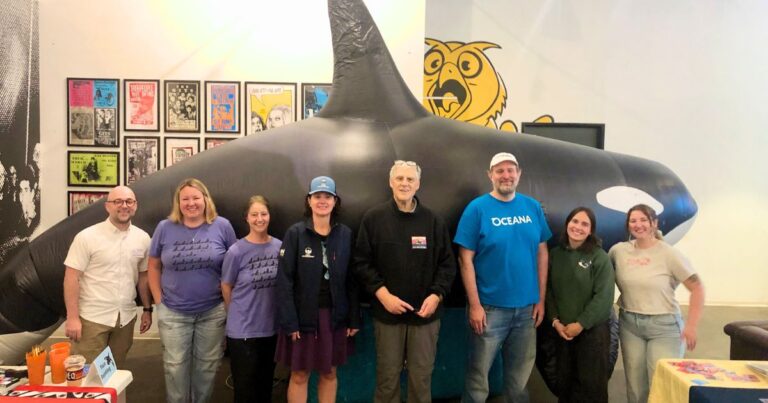By Angelique Chaverri, M.S.Ed., IMAP/IMC — Mother, educator, Stroller Brigade participant from Missouri
On Tuesday, October 29 of this year, I was blessed to join a group of more than 200 concerned parents, children, educators and health professionals to march on Capitol Hill to stand together and ask for reform of the 1976 Toxic Substances Control Act (TSCA).
We are the Stroller Brigade.
Why I went
Toxic chemicals in consumer products are largely untested and unregulated in the United States. Toxic flame retardants in our couches and car seats, PVC in Halloween costumes and much more threaten neurodevelopment and health at every moment of the day. As a mother of two boys with multiple severe food allergies and chemical sensitivities and a special education teacher in private practice, I see the consequences of toxic chemicals daily. I have to be vigilant in my own home, reading labels and calling manufacturers. Commercial sunscreen is not even an option for us.
In my practice, I have seen a shift over the years. When I first started in education, learning problems could usually be traced to either a medical event, such as a birth injury, or a similar difficulty in a parent. That is no longer the case. Again and again the parents I work with ask, “What caused this?” Sadly, increasing evidence is indicating that unregulated toxic chemicals are wreaking havoc in our genes, having multi-generational effects and are implicated in the rise of learning disabilities, developmental disabilities, fertility problems, asthma, cancer and more.
Most of the families I meet are aware of this problem and do what they can to shop their way around it.
This can be very costly. A non-toxic crib mattress can run in excess of $600. Most families do not have the means to make such purchases. One of the most frightening problems for me, as a mother, is that (under the Toxic Substances Control Act (TSCA)) many toxic chemicals are trade-secreted and manufacturers are not required to disclose their existence in their products. Even if you know a certain chemical will harm your unborn baby, you’ll never know where it is.
The Chemical Safety Improvement Act
In 1976, TSCA was introduced along with similar laws such as the Clean Air Act and the Clean Water Act. Unfortunately, TSCA was the one piece of legislation that was never given any teeth. TSCA has been such a failure that it wasn’t even able to regulate asbestos. It is also the only piece that has never been updated. Finally, this past summer, the Chemical Safety Improvement Act was introduced in the Senate (the House is also discussing reforms). The legislation has major flaws that would actually be a step backwards from the original TSCA.
In its current state, the Chemical Safety Improvement Act has several problems.
- It fails to protect vulnerable populations such as pregnant women, children and those living near large chemical polluters.
- It does not preserve state authority to regulate certain toxic chemicals.
- It adds unnecessary red tape to the regulation process, which would make it much harder for the EPA to take action.
- It does not establish adequate deadlines or timetables for assessments and safety determinations.
- Finally, the Chemical Safety Improvement Act does not require adequate data to prioritize chemicals in order of their threat to human safety.
As a native Oklahoman and a long-time resident of Missouri, I personally met with staffers from Senators McCaskill, Blunt, Inhoffe and Coburn’s offices. I was thankful to meet with Senator Blunt and Representative Tom Cole in person. I shared with each of them about the deep concern Missouri families have about these chemicals and their negative consequences on our children. I asked them for their support in improving this legislation so that our children are truly protected. In some offices, we were met with support and, in others, we found indifference.
What You Can Do
It is easy to feel overwhelmed and disillusioned with the issue of toxic chemicals in consumer products. At this moment in history, however, we have a unique opportunity to shape the future. Here’s what you can do.
- Educate yourself. Check out saferchemicals.org for more information.
- Vote with your dollars. Many companies are making great strides to produce non-toxic products. Give them your support. Ask retailers to be leaders in product safety.
- Call your Senators and Representatives. They want to hear from you on this issue. Sadly, Senator Blunt’s office shared with us that until we walked in that day, they had only heard from industry representatives concerning toxic reform. Remember, they work for you.
Let’s take this bull by the horns and make a real difference now. You can’t shop your way around this problem but, you can change the future for millions of American children by stepping up and making a simple phone call.




